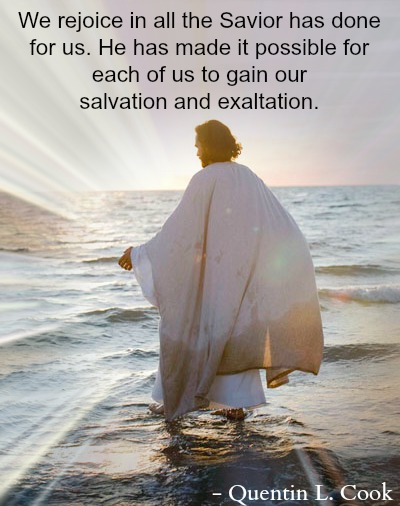When people attempt to argue Mormonism, they usually begin with some commentary on proof. They want proof—physical, tangible, and scientific—that it is true. When science or history discovers something that might help to “prove” an aspect of Mormonism, Mormons are generally interested, but these things don’t strengthen their testimonies. They are merely interesting.
 While this might irritate some Christians, it must be remembered that much of the Bible can’t be proven, either. Science has repeatedly refused to acknowledge the possibility of God, whose existence cannot be scientifically proven. Nor has science proven the Creation. We can’t fit some historical stories into the known political leadership of the time. We don’t have the bones of Adam and Eve. We haven’t found the ark, or proven the entire world once flooded at once. There are creatures mentioned in the Bible we haven’t been able to prove just yet—no dragons or unicorns have emerged during archaeological expeditions.
While this might irritate some Christians, it must be remembered that much of the Bible can’t be proven, either. Science has repeatedly refused to acknowledge the possibility of God, whose existence cannot be scientifically proven. Nor has science proven the Creation. We can’t fit some historical stories into the known political leadership of the time. We don’t have the bones of Adam and Eve. We haven’t found the ark, or proven the entire world once flooded at once. There are creatures mentioned in the Bible we haven’t been able to prove just yet—no dragons or unicorns have emerged during archaeological expeditions.
Does this shake the faith of the average Christian? Of course not. Faith is not about proof. If it can be proven, it doesn’t require faith. The Bible is filled with admonitions to have faith, not to have proof.
Paul gave a powerful sermon on faith in Hebrews, chapter 11 (King James version of the Bible): “Now faith is the substance of things hoped for, the evidence of things not seen. He reminds us of many Biblical heroes who lived their lives based on faith, not proof. Noah didn’t ask for proof of an impending flood before building the ark, Paul said, nor did Abraham ask for proof before moving to a new land or taking Isaac to be sacrificed. They trusted God and their own testimonies and acted without any proof at all that these things were necessary.
Faith is an essential element of religion. Mormons teach that faith is one of the primary reasons God sent us here to earth. Could we learn to believe in Him and trust Him when He isn’t right here, in our sight? We believed we could and agreed to come to earth to gain faith, to be tested, and to obtain families and bodies.
Most Christians accept a responsibility to develop faith in Jesus Christ, and to agree to accept Him as our Savior without any physical proof of His existence. We don’t know where He is buried. There are no official records recording His life. He never wrote a word that we have on hand, and no one painted His picture or sculpted His likeness. We don’t know what He looked like. We can only make assumptions based on historical knowledge of the time and place in which He lived, and we must trust the recorded words of others as to His existence and teachings. And yet, with all this lack of physical proof, billions of people have believed in Jesus Christ and modeled their lives on His teachings.
Mormons, like other Christians, know that testimony isn’t about physical proof. It is about learning to know and to trust God. Testimony is about faith, which is a higher law than proof. Faith is an eternal-life-giving law.
Christians, including Mormons, know that faith is a verb. A passive faith is not really faith. When we know that putting our hands into a fire will burn them, we don’t put our hands into the fire. We act on those things we truly know. Faith, then, must be an active faith. It isn’t enough to say we believe God has taught us not to kill, for instance. We must also act on that belief. A true Christian keeps the commandments of God as evidence of His faith. Just as Noah didn’t ask for proof, neither do Christians ask for proof before deciding to live the gospel of Jesus Christ.
While it is possible to keep the commandments without faith, it is not possible to have true faith and refuse to keep the commandments. No one is perfect, but a person with faith is constantly striving to live as Jesus taught. James taught,“ 14 What doth it profit, my brethren, though a man say he hath faith, and have not works? can faith save him?
15 If a brother or sister be naked, and destitute of daily food,
16 And one of you say unto them, Depart in peace, be ye warmed and filled; notwithstanding ye give them not those things which are needful to the body; what doth it profit?
17 Even so faith, if it hath not works, is dead, being alone.
18 Yea, a man may say, Thou hast faith, and I have works: shew me thy faith without thy works, and I will shew thee my faith by my works. (James 2)
These verses do not mean we can be saved by works done without faith, but simply for show. It means that a person who believes in and loves God will keep His commandments as a natural part of that love and faith.
Christians, including Mormons, keep the commandments even though they lack physical proof that rewards will come, either in this life or the next. For them, faith is enough to inspire a Christian lifestyle.
“Faith in Jesus Christ and a testimony of Him and His universal Atonement is not just a doctrine with great theological value. Such faith is a universal gift, glorious for all cultural regions of this earth, irrespective of race, color, language, nationality, or socioeconomic circumstance. The powers of reason may be used to try to understand this gift, but those who feel its effects most deeply are those who are willing to accept its blessings, which come from a pure and clean life of following the path of true repentance and living the commandments of God” (Dieter F. Uchtdorf, “Precious Fruits of the First Vision,” Ensign, Feb 2009, 4–8).
Physical proof that Mormonism is true is no more essential to a Mormon than is physical proof of God, Jesus, or the Bible to any other Christian. Faith and testimony isn’t brought about by proof, but by a personal knowledge of God, and the willingness to turn to Him as the source of all truth. Science is constantly changing its mind about proof, but God never changes His mind. It comes down to this question: Who is our God—God, or science? Mormons, while respecting the role of science, choose God.
The late Terrie Lynn Bittner—beloved wife, mother, grandmother, and friend—was the author of two homeschooling books and numerous articles, including several that appeared in Latter-day Saint magazines. She became a member of the Church at the age of 17 and began sharing her faith online in 1992.






